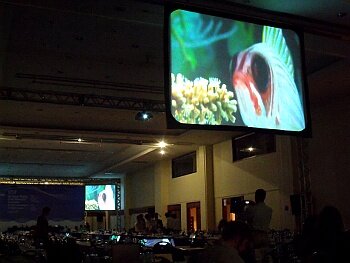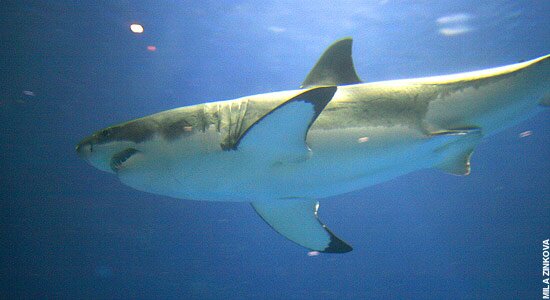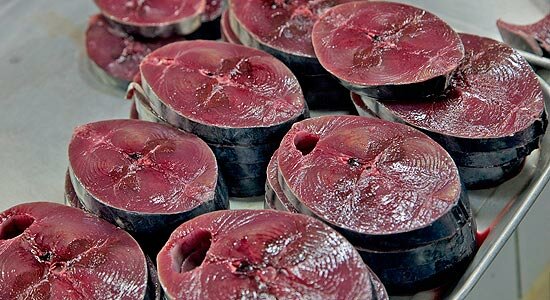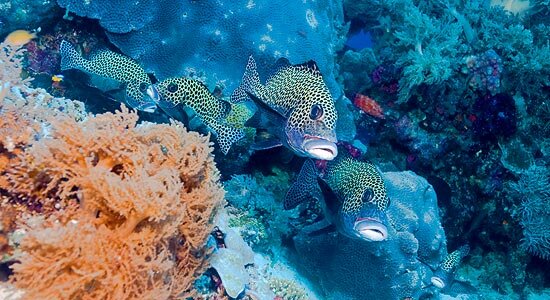Watch a news report of the launch on The End of the Line in South Africa featuring an interview with Charles Clover.
![]()
Watch a news report of the launch on The End of the Line in South Africa featuring an interview with Charles Clover.
![]()
Talks are at an advanced stage between the Foreign Office, the Bertarelli Foundation and the Blue Marine Foundation about funding the creation of the largest marine reserve in the world around the British Indian Ocean Territory.
Watch a video of the Chagos here:
Chagos Marine Protected Area from Jon Slayer on Vimeo.
The Bertarelli Foundation, presided over by Ernesto Bertarelli, whose team twice won the America’s Cup, has agreed to provide £3.5 million in funding to cover the policing of the new Marine Protected Area, the creation of which was one of the last acts of the outgoing Labour administration.
The coalition has been faced with finding ways of making good the shortfall caused by ending lucrative tuna fishing licences which were providing £750,000 a year in revenue so a no-take reserve could be established in what has been described as Britain’s Galapagos or Great Barrier Reef.
No contracts have yet been signed between the Bertarelli Foundation, Blue and the Government but they are in the process of being drawn up and the Foreign Secretary and the Bertarelli Foundation approved the deal in principle last week.
Since the announcement of the creation of the reserve by David Miliband, when Foreign Secretary, there has been the discovery by scientists from the Zoological Society for London of a significant concentration of sea mounts within the 200 mile limit of the BIOT, many of which are expected to be hotspots for biodiversity.
Alex D Rogers of ZSL said: “Our modelling of the global distribution of seamounts indicates that there are up to 86 large seamounts and over 200 smaller knolls in the Chagos area. Seamounts are often important hotspots of biological activity in the oceans and may host diverse communities of animals in coral gardens or cold-water coral reefs. Furthermore, our modelling of the suitability of deep-sea habitat for octocorals (sea fans and gorgonians), indicates that the Chagos area is also highly favourable for these animals. This raises the exciting prospect that through closing the Chagos Archipelago and surrounding waters to fishing, significant deep-water habitats may have been protected within the Indian Ocean, a region subject to widespread and potentially increasing exploitation of deep-water resources.”
Henry Bellingham, Parliamentary Under Secretary of State and Minister for the Overseas Territories at the Foreign Office, said “This Government is committed to the Marine Protected Area in the British Indian Ocean Territory. As the world’s largest marine reserve, the MPA will bring huge environmental benefits to the Indian Ocean and to the world. “It will double the global coverage of the world’s oceans benefiting from full protection. We hope that the UK’s example encourages others to do the same in other vulnerable areas. We are very grateful to the Bertarelli family, their foundation and to the Blue Marine Foundation for their interest and we look forward to working with them. This Government wants to form innovative partnerships with the private sector to deliver ambitious objectives.This is a great example of how this could work in practice.”
Charles Clover, founding trustee of the Blue Marine Foundation, said: “Towards the end of last year I was beginning to doubt whether a marine protected area around the Chagos archipelago, which includes half the remaining unspoiled coral reefs in the Indian Ocean, would ever come into being, even if one was declared. I was worried that in a time of austerity no incoming government could sign up to the public spending involved. I told George Duffield and Chris Gorell Barnes, two of the producers on our film, The End of the Line, that this amazing breakthrough in the protection of the oceans might now not happen because of what is to a government a relatively small amount of money.”
Charles continues “I said surely there has to be someone, perhaps even a single individual, who takes the plight of the oceans seriously enough and has the money to fund this? George went out and found Ernesto Bertarelli and his foundation who have the vision and the pockets to match. Hats off to them. The Indian Ocean, its fisheries and coral reefs are not in good shape and the protection of such a fabulous and still largely unspoiled area in the middle of the ocean will help to protect its biodiversity and give its fisheries some respite against attrition. We hope other nations around the Ocean follow suit.”
The Blue Marine Foundation was set up as a result of The End of the Line and before the Chagos funding crisis came along to look at private sector solutions in the oceans which could create reserves or improve the sustainability of fisheries. It will be trying to put together other deals and to persuade more boats to fly its flag in the future.
The Blue Marine Foundation was founded by Charles Clover, George Duffield & Chris Gorell Barnes in order to fund the creation of a global network of marine reserves and to provide private sector solutions for the sea.
The Blue marine Foundation has appointed 5 trustees: -Tom Appleby, Lord Deben, DR Arlo Brady, Kate Goldsmith, and Mark Rose.
![]()
It was an ambush. Fishing nations, led by Libya, ruthlessly voted down proposals to ban international trade in Atlantic bluefin tuna at the meeting of 115 parties to the Convention on International Trade on Endangered Species this afternoon.
Delegates from Monaco, the EU and the United States had hoped to keep the proposals being discussed into next week in the hope that compromises could be found. In the event, the debate was short and not at all sweet. Monaco’s proposal for an unqualified trade ban was rejected by 68 votes to 20, with 30 abstentions. Before that, the EU’s highly qualified version of the same proposal was crushed by 72 votes to 43.
The debate began with Monaco’s ambassador, Patrick Van Klaveren, speaking out in favour the proposal to place the Atlantic bluefin on Cites Appendix 1, on the grounds that the tuna had declined to less than 15 per cent of its original stock and UN scientists from two official bodies accepted that the criteria for it to be listed on Appendix 1 had been met.
This was followed by a lacklustre presentation, by the Spanish presidency, in favour of the conditions the EU wanted to place on the proposal. Then, instead of the torrent of support conservationists had hoped for there was a cascade of fishing nations, starting with Canada, speaking out against the proposed ban and in favour of leaving the management of the bluefin with the Atlantic tuna commission, ICCAT, which until recently has failed to set scientifically based quotas or to crack down on illegal fishing.
Speeches in favour of ICCAT continuing to manage the species, which can fetch up to $100,000 for a single specimen on the Japanese market, rolled on – Indonesia, Tunisia, United Arab Emirates, Venezuela, Chile, Japan, Grenada, Korea, Senegal, Morocco.
Tunisia talked of social problems that would be caused if there was a ban, Morocco spoke of 2000 families in an area of no other employment who would have no income. Morocco said the bluefin was a flagship species it was in the interests of all to preserve, but said it was premature to regulate it under Cites.
Only Kenya, Norway and the United States spoke up in favour of a ban, despite advice from both the UN Food and Agriculture Organisation and ICCAT’s own scientific committee that the bluefin deserved a respite from international trade.
By the time the eccentric Libyan delegate got the floor, it was clear where the majority lay. All it took was for Libya to propose a vote on Monaco’s proposal, and the chairman of the meeting, John Donaldson, had to put the proposal to close the debate to the meeting.
It was quite clear from there what would happen. Once the vote to hold a vote had been passed, the votes on the EU’s and Monaco’s vote were both lost.
Patrick Van Klaveren, for Monaco, said magnanimously: “It is not a defeat it is the manifestation of confidence put in ICCAT to solve the problem.” He threatened to come back in 2013 with another proposal to list the bluefin under Appendix 1 if ICCAT failed to take up the challenge to manage the bluefin for recovery.
At the press conference he shook hands with the leader of the Japanese delegation, Mitsunori Miyahara, who had taken part in the defeat of an attempt to place the bluefin on Cites in 1992.
Mr Miyahara, chief counsellor to the Japanese Fisheries Agency, said: “We agree that the bluefin is not in good shape. We have to take any measure for recovery. We have to work harder from now on.”
He said that at last November’s meeting of ICCAT, “finally the system started to work.”
“We are going to wipe out illegal fish from our markets.”
Sue Lieberman of the Pew Environment Trust branded the decision “irresponsible.”
“This meeting has said let’s take science and throw it out the door. There was clearly pressure from fishing industry. This fish is too valuable for its own good.
“Statements made about ICCAT blatantly were false. It’s time to hold ICCAT’s feet to the fire. We will be there every step of the way.”
Charles Clover
![]()
Doha 18/03/10
The Maldives has announced that it has banned shark fishing in its waters, creating a sanctuary for those species in the Indian Ocean.
The Maldives currently allows only pole and line fishing for tuna.
The Maldives representative said at the Cites meeting that the island government was hoping that this would be a contribution to global conservation and would benefit its tourism industry which is heavily geared to dive tourism. But it was looking to other countries to adopt similar policies to save sharks.
A proposal to ban the commercial trade in polar bear parts and products, submitted by the US, was defeated by 62 votes to 48. So far no signnificant proposals have been passed at the Doha meeting. The Mariana Mallard was deleted from the Cites list on the grounds that it is probably extinct and therefore impossible to conserve.
Charles Clover
![]()
The End of the Line was shown in remarkable circumstances this week – in the official convention hall of a hotel near Recife, Brazil, where the world’s oldest whole-ocean fisheries management organisation was meeting to set controversial catch limits for the Atlantic’s dwindling populations of tuna, swordfish and sharks.

The End of the Line is shown at the International Commission for the Conservation of Atlantic Tunas meeting in Brazil
It took a certain amount of persuasion. It needed the crucial backing of the Brazilian chairman of the meeting, Prof Fabio Hazin (the curiosity of these meetings is that the chairmen are usually enlightened while the contracting parties from the fishing nations, which include Libya, are anything but).
It also needed a mysterious process of agreement from heads of delegations sitting in closed session.
The chief scientist, Dr Gerald P Scott, an American, was consulted, and pronounced in a neutral kind of way that the idea of showing a film, after and outside the official business of the day, was something that had been done before - though quite when nobody could remember - and might provide an opportunity some delegates might not otherwise get to see it. The film was duly shown in the convention centre, on official equipment.
Was this a sign that the dysfunctional International Commission for the Conservation of Atlantic Tunas – often known to its critics as the International Conspiracy for Catching All The Tuna – was at last beginning to listen to voices outside the fishing industry, such as the citizens who actually pay them to manage the sea? No one could say for sure.
About 40 people postponed their need for a beer or managed to slip out of meetings to see the film. Some of these, inevitably, were the already converted: conservationists who were seeing the film as an act of solidarity with its message.
Two Asian delegations stood around talking before filing out. But here and there, as you looked around, were some senior delegation folk sitting in small groups including, significantly, most of the Spanish delegation. At the end, there was applause.
We were approached the next night by the secretariat requesting a second screening for delegations, principally Mexico, that had missed the screening we had organised because of meetings. So we were back by popular demand.
Could the message be getting out that our seas are a mess and ICCAT has failed for 40 years to tackle the problem of the depleting Atlantic ocean?
Whether or not this was a sign of changing times, for once this week the message got through.
Ends
![]()
There have been many articles and reviews featuring The End of the Line this week following the film’s release in the United States on 19th June.
Entertainment Weekly’s review of the film says: “Fishermen are no longer simply ”fishing.” They’re subjecting threatened species to the equivalent of carpet bombing, and this passionate ecological documentary, The End of the Line, spells out the problem in clear, urgent, prosaic terms.”
Twilight Greenaway, writing for The Ethicurean, suggests that the film missed one point that would help sustain life in the oceans - eating less fish. She went on to say: “Since seeing the film, the possibility of thriving oceans once again full of wild fish of all colours and sizes seems ever more compelling.
“With that image in my mind, giving up most seafood — seeing it as a rare treat, as Mark Bittman wrote recently in the New York Times — until then doesn’t felt like much of a sacrifice.” Continue reading ‘News and blogs round up for The End of the Line’
![]()
A couple of stories in the press today caught my eye. Both are about what we internally refer to as ‘charismatic megafauna’ (the big animals people tend to be interested in and care about), but they are also both damning indictments of our failure to protect our oceans and the life that depends on them.

Great white shark: Many sharks are killed as fishing bycatch or for their valuable fins
Firstly – in the week of the International Whaling Commission meeting in Madeira, Portugal – whilst lots of countries get together to talk lots and try not to upset each other too much, the BBC reports that a highly-endangered species of porpoise is being pushed ever closer to extinction.
In a world panicking about recession and swine flu the conservation of this highly-endangered species is dropping off the priority list.
The Vaquita (the name means ‘little cow’ in Spanish) is one of the world’s smallest cetaceans (the family that includes whales, dolphins and porpoises) … and it gets much less air time than its bigger, more familiar cousins.
Yet it is really on the edge. It is the unwitting victim of bycatch in fisheries – something dolphin and porpoise lovers are all-too-familiar with in UK waters. And in late 2007 scientists warned that unless action was taken, the species could be extinct in just a few years.
But just in case you are rolling your eyes at the thought of Greenpeace being concerned about ‘cuddly’ porpoises – think on, as the news reports today are awash with dire warnings on more contentious oceanic animals too.
A new study shows that over a third of the world’s open ocean sharks are now threatened with extinction, including widely-recognisable species like hammerheads and great whites (There’s a nice photo gallery showing them off over on The Guardian website).
The major threat? Why, it’s destructive and unsustainable fishing practices – killing sharks as bycatch, and targeting them for their valuable fins. This of course is why we’ve been campaigning on tinned tuna – an industry which can have a dramatic impact on sharks, as well as turtles and other species.
Thankfully it is now quite easy to find pole-and-line caught tuna in the UK – caught using the most environmentally-friendly method - but the rest of the tuna industry still has a long way to go.
Sharks and porpoises are particularly vulnerable, being long lived, slow-growing animals. But they are also critters that people at least can recognise and express an interest in. If we can’t do right by those ones, what hope is there for the less charismatic inhabitants of our oceans
![]()
I’m writing this from Utah, a landlocked state in the US, which hosts the Sundance Film Festival each year.

Greenpeace stage a fun protest on overfishing with a walkabout by a guppie
Sundance is known as *the* place for new independent films, and we’re here to support a great new documentary movie about what overfishing is doing to our oceans.
As anyone familiar with the oceans campaign knows, after climate change, fishing is the biggest threat to life in our oceans – ruthlessly overfishing stocks, discarding perfectly-marketable fish, needlessly killing other species as bycatch, and trashing entire habitats with destructive fishing gear.
Yet since it’s being done out at sea, and out of sight, it’s largely out of mind for most people. Just how much thought do most people give to the fish they eat? Do they know where it comes from? How it was caught? Continue reading ‘What’s Greenpeace doing at Sundance Film Festival?’
![]()
When the history of the last half century is written, will we think that governments, scientists and environmental leaders identified the right global problems and got to grips with them, as the human population doubled, and looked like doing so again?

Fish steaks - Rampant, uncontrolled fishing is already pushing whole species, such as the magnificent bluefin tuna towards extinction
Or will we think that huge problems emerged on our watch while reason slept?
The inconvenient truth about the sea, which covers 70 per cent of the Earth, is that arguably the worst impact upon it so far – if you study the latest scientific assessments - has been caused by the mundane pursuit of human food and not by global warming or acidification, major threats though these are to our common future. Continue reading ‘The inconvenient truth about the sea’
![]()
At the time of writing I am making last minute preparations to go to Sundance after a marathon two years of production and post-production of our ocean epic The End Of the Line. We only finished last week.

About two and half years ago I picked up a book called The End of The Line by Charles Clover in an airport lounge (a moment I have replayed many times in my mind since. Sometimes during the harder periods of production I wished that I had chosen the romantic novel sitting next to it).
I was on the way to Los Angeles to talk about making my previous doc into a feature and when I got off the plane I knew I had to make this book into a film and I put the feature on hold.
It was the film about the oceans I always had wanted to make but until that time no one had put all the pieces together in such an elegant, devastating and coherent way.
It has been an incredible experience for the whole Fish Team, myself included, to have worked on a film that we believe and hope will have a real impact on how we treat our seas.
The End Of The Line asks quite a hard question – how is it possible that 3.5 billion years of evolution in the sea could be extinguished in a single human lifetime?
Are we really going to see the end of wild fish in the sea over the next half century?
The Hollywood pitch for our film would be ‘The Blue Planet meets a lie detector test’. That film and many other natural history films about the oceans perpetuate a myth about the sea that is simply untrue – that life exists untouched by man. Continue reading ‘Preparing for the Sundance Film Festival’
![]()
George Bush has designated 200,000 square miles of the Pacific as conservation areas in a bid to re-write his conservation reputation before he leaves office.

Mr Bush, who has steadfastly refused to impose statutory limits on carbon dioxide emissions to combat global warming, became the leader who has protected more of the oceans than anyone else in the world.
The areas protected, with the active intervention of the First Lady, Laura Bush, include pristine coral reefs, the habitat of vanishing marine species, and the deepest place on Earth, the Mariana Trench. Continue reading ‘George Bush designates marine reserves the size of Texas as one of last acts as president’
![]()